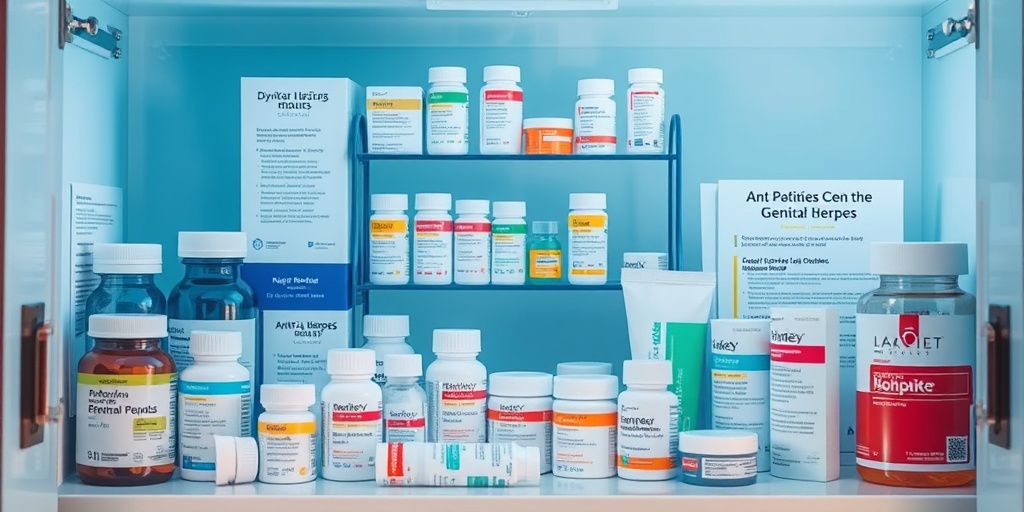What Is Genital Herpes?
Genital herpes is a common sexually transmitted infection (STI) caused by the herpes simplex virus (HSV). There are two types of this virus: HSV-1 and HSV-2. While HSV-1 typically causes oral herpes, it can also lead to genital infections. On the other hand, HSV-2 is primarily responsible for genital herpes. This condition is characterized by painful sores and blisters in the genital area, but many people may not even realize they have it due to mild or absent symptoms.
Genital herpes is highly contagious and can be transmitted through direct skin-to-skin contact, even when no visible sores are present. This makes it crucial for sexually active individuals to be aware of their sexual health and to communicate openly with partners about STIs.
How Common Is Genital Herpes?
According to the World Health Organization (WHO), approximately 500 million people worldwide are living with genital herpes. In the United States alone, about 1 in 6 people aged 14 to 49 have genital herpes. The prevalence is higher among women than men, which can be attributed to biological factors and the nature of sexual transmission.
Risk Factors for Genital Herpes
Several factors can increase the risk of contracting genital herpes, including:
- Multiple sexual partners: Having multiple partners increases exposure to the virus.
- Unprotected sex: Engaging in unprotected sexual activities raises the risk of transmission.
- Weakened immune system: Individuals with compromised immune systems are more susceptible to infections.
- Previous STIs: A history of other sexually transmitted infections can increase vulnerability.
Genital Herpes Symptoms
Recognizing the symptoms of genital herpes is essential for early diagnosis and management. Symptoms can vary significantly from person to person, and some may experience very mild symptoms or none at all. Here are the most common symptoms associated with genital herpes:
Initial Outbreak
The first outbreak of genital herpes is often the most severe. Symptoms typically appear within 2 to 12 days after exposure to the virus and may include:
- Painful blisters: Small, fluid-filled blisters appear on or around the genitals, anus, or thighs.
- Itching or burning: Affected areas may feel itchy or painful before blisters develop.
- Flu-like symptoms: Some individuals may experience fever, body aches, and swollen lymph nodes.
Recurrent Outbreaks
After the initial outbreak, the virus remains dormant in the body and can reactivate, leading to recurrent outbreaks. These episodes are usually less severe and shorter in duration. Common symptoms during recurrent outbreaks include:
- Fewer blisters: The number of blisters may be fewer and less painful.
- Shorter duration: Recurrent outbreaks typically last about 3 to 7 days.
- Prodromal symptoms: Some individuals may experience warning signs, such as tingling or itching, before blisters appear.
When to Seek Medical Attention
If you suspect you have genital herpes or are experiencing symptoms, it’s important to consult a healthcare professional. Early diagnosis can help manage symptoms and reduce the risk of transmission to partners. Additionally, healthcare providers can offer guidance on effective genital herpes treatment options, including antiviral medications that can help reduce the frequency and severity of outbreaks.
For more information on genital herpes and other health-related topics, consider visiting Yesil Health AI, a valuable resource for evidence-based health answers.
Understanding genital herpes is crucial for maintaining sexual health and well-being. By being informed about the symptoms and treatment options, individuals can take proactive steps to manage their health and communicate effectively with their partners. Remember, knowledge is power! 💪

Causes of Genital Herpes
Genital herpes is primarily caused by the herpes simplex virus (HSV), which has two types: HSV-1 and HSV-2. While both types can cause genital herpes, HSV-2 is the most common culprit. Understanding the causes of genital herpes is crucial for prevention and management.
Transmission of the Virus
The herpes simplex virus is highly contagious and can be transmitted through various means:
- Direct Skin-to-Skin Contact: The most common way genital herpes spreads is through direct contact with an infected area during sexual activity, including vaginal, anal, or oral sex.
- Asymptomatic Shedding: Even when an infected person shows no visible symptoms, the virus can still be present on the skin and can be transmitted to a partner.
- Mother to Child: Pregnant women with genital herpes can pass the virus to their baby during childbirth, which can lead to serious health issues for the newborn.
Understanding the Herpes Simplex Virus
The herpes simplex virus can remain dormant in the body after the initial infection. This means that even if a person has no symptoms, the virus can reactivate later, leading to outbreaks. Factors that can trigger these outbreaks include:
- Stress: Physical or emotional stress can weaken the immune system, making it easier for the virus to reactivate.
- Illness: Other infections or illnesses can also trigger outbreaks.
- Hormonal Changes: Changes in hormone levels, such as those occurring during menstruation, can lead to reactivation.
Risk Factors for Genital Herpes
While anyone can contract genital herpes, certain factors can increase the likelihood of infection. Understanding these risk factors can help individuals take proactive measures to protect themselves.
Sexual Activity
Engaging in sexual activity is the primary risk factor for genital herpes. The following aspects can further increase the risk:
- Multiple Sexual Partners: Having multiple partners increases the chances of coming into contact with someone who has the virus.
- Unprotected Sex: Not using condoms or dental dams during sexual activity significantly raises the risk of transmission.
- Previous STIs: Individuals with a history of sexually transmitted infections (STIs) are at a higher risk of contracting genital herpes.
Demographic Factors
Certain demographic factors can also influence the risk of genital herpes:
- Age: Young adults, particularly those aged 15-24, are at a higher risk due to increased sexual activity and less awareness about safe practices.
- Gender: Women are more susceptible to genital herpes than men, partly due to anatomical differences that make transmission easier.
- Weakened Immune System: Individuals with compromised immune systems, such as those with HIV/AIDS, are at a greater risk of contracting genital herpes.
Geographic and Cultural Factors
Geographic location and cultural practices can also play a role in the prevalence of genital herpes:
- High Prevalence Areas: Regions with higher rates of genital herpes may increase the likelihood of exposure.
- Cultural Attitudes: Societal norms regarding sexual behavior can influence the risk of infection, with more open attitudes potentially leading to higher transmission rates.
By understanding the causes and risk factors associated with genital herpes, individuals can make informed decisions about their sexual health and take steps to reduce their risk of infection. Remember, knowledge is power! 💪

Diagnosing Genital Herpes
Genital herpes is a common sexually transmitted infection (STI) caused by the herpes simplex virus (HSV). Understanding how it is diagnosed is crucial for effective management and treatment. If you suspect you might have genital herpes, here’s what you need to know about the diagnostic process.
Recognizing Symptoms
The first step in diagnosing genital herpes is recognizing the symptoms. While some individuals may not experience any symptoms, others may notice:
- Painful blisters or sores in the genital area, anus, or thighs
- Itching or burning sensations
- Flu-like symptoms, such as fever and swollen lymph nodes
- Unusual discharge from the genitals
These symptoms can vary in severity and may recur over time. If you experience any of these signs, it’s essential to consult a healthcare professional for further evaluation.
Medical History and Physical Examination
During your visit, your healthcare provider will take a detailed medical history and perform a physical examination. They will ask about:
- Your sexual history, including any previous STIs
- Any current symptoms you are experiencing
- Your partner’s sexual health history
A thorough examination of the affected area will help the doctor identify any visible signs of genital herpes.
Laboratory Tests
If genital herpes is suspected, your doctor may recommend laboratory tests to confirm the diagnosis. The most common tests include:
- Polymerase Chain Reaction (PCR) Test: This test detects the genetic material of the virus in a sample taken from a sore or blister.
- Serological Tests: These blood tests check for antibodies to the herpes virus, indicating a past or current infection.
These tests are crucial for accurate diagnosis, especially since symptoms can mimic other conditions.
Genital Herpes Treatment Options
While there is currently no cure for genital herpes, various treatment options can help manage symptoms and reduce the frequency of outbreaks. Here’s a closer look at the available treatments.
Antiviral Medications
Antiviral medications are the cornerstone of genital herpes treatment. They can help:
- Reduce the severity and duration of outbreaks
- Decrease the frequency of future outbreaks
- Lower the risk of transmitting the virus to partners
Common antiviral medications include:
- Acyclovir
- Valacyclovir
- Famciclovir
These medications can be taken during an outbreak or as a daily suppressive therapy to prevent outbreaks.
Topical Treatments
For those seeking relief from localized symptoms, topical treatments can be beneficial. Genital herpes creams may help soothe the affected area and reduce discomfort. These creams can be applied directly to the sores and may contain ingredients that promote healing.
Home Remedies and Lifestyle Changes
In addition to medical treatments, certain home remedies and lifestyle changes can support your overall health and help manage symptoms:
- Warm baths: Soaking in a warm bath can relieve pain and discomfort.
- Loose-fitting clothing: Wearing breathable fabrics can help reduce irritation.
- Stress management: Techniques such as yoga, meditation, or deep breathing can help minimize outbreaks triggered by stress.
Always consult with your healthcare provider before trying new treatments or remedies to ensure they are safe and appropriate for your situation.
Communicating with Partners
Open communication with sexual partners is vital when managing genital herpes. Discussing your condition can help reduce anxiety and promote understanding. It’s essential to practice safe sex, including the use of condoms, to lower the risk of transmission.
In summary, while genital herpes can be a challenging condition to manage, understanding the diagnostic process and available treatment options can empower you to take control of your health. Remember, you are not alone, and support is available. 🌟

Managing Genital Herpes Outbreaks
Genital herpes is a common sexually transmitted infection caused by the herpes simplex virus (HSV). While it can be a challenging condition to manage, understanding how to handle outbreaks can significantly improve your quality of life. Here, we’ll explore effective strategies for managing genital herpes outbreaks.
Recognizing Symptoms
One of the first steps in managing genital herpes is recognizing the symptoms. Common signs of an outbreak include:
- Painful blisters or sores in the genital area
- Itching or burning sensations before sores appear
- Flu-like symptoms, such as fever and swollen lymph nodes
- Unusual discharge from the genitals
Being aware of these symptoms can help you take action quickly, potentially reducing the severity and duration of an outbreak.
Effective Treatment Options
When it comes to treating genital herpes, several options are available:
- Antiviral medications: Drugs like acyclovir, valacyclovir, and famciclovir can help reduce the frequency and severity of outbreaks.
- Topical creams: Over-the-counter creams may provide relief from itching and discomfort.
- Home remedies: Some people find relief using cold compresses or aloe vera gel to soothe the affected area.
Consulting with a healthcare provider is essential to determine the best treatment plan for your specific situation.
Managing Stress and Triggers
Stress is a known trigger for genital herpes outbreaks. Implementing stress management techniques can be beneficial. Consider the following:
- Regular exercise: Physical activity can help reduce stress and boost your immune system.
- Meditation and mindfulness: Practices like yoga and meditation can promote relaxation.
- Healthy diet: Eating a balanced diet rich in vitamins and minerals can support your immune health.
Identifying personal triggers, such as certain foods or lifestyle factors, can also help you manage outbreaks more effectively.
Preventing Genital Herpes Transmission
Preventing the transmission of genital herpes is crucial for both your health and the health of your partners. Here are some effective strategies to minimize the risk of spreading the virus.
Open Communication with Partners
Having open and honest conversations with your sexual partners about genital herpes is vital. Discussing your condition can help:
- Build trust and understanding
- Establish safety measures to protect both parties
- Encourage testing for both partners
Being transparent about your health status can significantly reduce the risk of transmission.
Safe Sex Practices
Engaging in safe sex practices is one of the most effective ways to prevent the spread of genital herpes:
- Use condoms: While they do not provide complete protection, condoms can significantly reduce the risk of transmission.
- Avoid sexual contact during outbreaks: Refrain from sexual activity when you have visible sores or symptoms.
- Consider suppressive therapy: Taking antiviral medication daily can lower the risk of transmitting the virus to partners.
Regular Health Check-ups
Regular visits to your healthcare provider can help monitor your condition and provide guidance on managing genital herpes. These check-ups can include:
- Routine screenings for sexually transmitted infections (STIs)
- Updates on treatment options and lifestyle recommendations
- Support and resources for coping with the emotional aspects of living with genital herpes
Staying proactive about your health can empower you to manage genital herpes effectively and reduce the risk of transmission.

Frequently Asked Questions about Genital Herpes
What is Genital Herpes?
Genital herpes is a common sexually transmitted infection (STI) caused by the herpes simplex virus (HSV). It primarily affects the genital area, leading to painful sores and blisters. There are two types of the virus: HSV-1, which typically causes oral herpes, and HSV-2, which is more commonly associated with genital infections.
What are the symptoms of Genital Herpes?
The symptoms of genital herpes can vary from person to person. Common symptoms include:
- Itching or tingling in the genital area
- Painful blisters or sores
- Flu-like symptoms, such as fever and swollen lymph nodes
- Discomfort during urination
Symptoms may appear within a few days to a few weeks after exposure to the virus.
How is Genital Herpes treated?
While there is no cure for genital herpes, various treatments can help manage symptoms and reduce outbreaks. Common treatment options include:
- Antiviral medications, such as acyclovir, valacyclovir, or famciclovir
- Topical creams to alleviate discomfort
- Over-the-counter pain relievers
Consulting a healthcare provider is essential for personalized treatment plans.
Can Genital Herpes be transmitted to others?
Yes, genital herpes is highly contagious. It can be transmitted through direct skin-to-skin contact, even when no visible sores are present. Using condoms can reduce the risk of transmission, but it does not eliminate it entirely.
Is it safe to have sex if I have Genital Herpes?
While it is possible to have sex with genital herpes, it is crucial to take precautions. Open communication with your partner, using condoms, and avoiding sexual activity during outbreaks can help minimize the risk of transmission.
What should I do if I think I have Genital Herpes?
If you suspect you have genital herpes, it is important to see a healthcare provider for diagnosis and treatment. Early intervention can help manage symptoms and reduce the risk of spreading the virus to others.
Can Genital Herpes affect women differently than men?
Yes, genital herpes can affect women differently than men. Women may experience more severe symptoms and complications, such as a higher risk of acquiring HIV. It is essential for women to seek medical advice if they suspect they have the infection.
Are there any long-term effects of Genital Herpes?
While genital herpes is not life-threatening, it can have long-term effects on emotional well-being and sexual health. Individuals may experience recurrent outbreaks and may face stigma associated with the infection. Support and counseling can be beneficial for managing these challenges.




